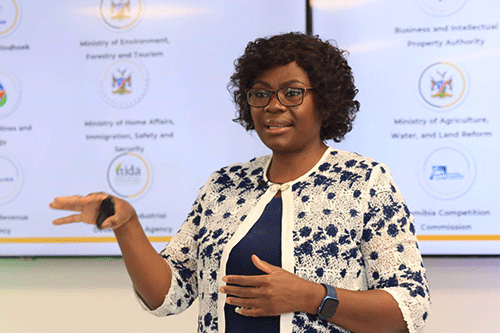Namibia has secured about N$161 billion worth of investment opportunities as at March 2023 with the potential to create more jobs. This was the uplifting news from CEO of the Namibia Investment Promotion and Development Board, Nangula Uaandja, who made the announcement last week.
“Namibia has a drastic pipeline, signifying that the country has been heard by world players. Delegations that have been visiting our offices have increased drastically, and are coming from all over the world. We have facilitated 46 delegations,” she said during a media briefing.
Uaandja explained that those now operational are worth about N$2.8 billion, while funding from those investors who are yet to make a final decision for the flow of capital to commence currently stands at N$24.1 billion.
The third stage, namely the investors who have decided to invest and are now preparing all necessities and getting procedures in place to kick-start their projects, stands at N$38.8 billion. Then, the final stage, known as the lead stage, where there are investors enquiring about final investment decisions, stands at N$95.3 billion.
The NIPDB is the national body tasked with public and private sector collaboration to ensure the nation has a business-conducive climate. As part of its core mandate, the NIPDB seeks to attract and retain investments while at the same time promoting Namibia as a place to develop, live, invest and work in.
The pipeline, Uaandja said, is dominated by new and private investments.
“There are other projects that happened in Namibia which are not in the pipeline. Additionally, there is now diversification in the sectors for new investments, not like before, where the renewable sector accounts for 73% of the pipeline,” she added.
Currently, the top three leading sectors in the pipeline are renewables (39%), agriculture and food processing (24%), and oil and gas (19%).
Furthermore, the NIPDB CEO stated that the operational projects, supported by the board, are creating only 244 direct and permanent jobs, plus 206 temporary positions.
Uaandja noted that the NIPDB is pursuing collaboration between government and the private sector to deliver value for the country.
The impact on the economy from the investments will only be felt in a year or two to tackle Namibia’s triple challenges of poverty, unemployment and inequality.
Challenges
The investment board also had cases where investors showed interest in Namibia, and then left abruptly. These types of interactions are particularly prevalent in the lead stage, where investors gather information such as types of incentives, cost of doing business, applicable taxes, access to markets, administration processes and the availability of land.
These factors, she said, are amongst those that cause investors to exit the investment pipeline.
In the quest to solve lengthy administrative processes for investors, the NIPDB last year launched a One-Stop Centre (OSC). This centre streamlines procedures for new and existing investors to enable them to easily conduct their businesses in an enabling investment environment. The OSC is operational, but is not at full capacity yet.
Media role
The NIPDB CEO also urged the media industry to be objective in writing articles which can either attract investors, or make them leave Namibia. “You should hold us accountable, and also help us promote Namibia to the rest of the world,” she insisted.
Next African gem
According to an African Wealth Report for March 2023, Namibia provides many opportunities for international investors seeking a foothold and growth on the African continent. These include tax incentives, financing and a one-stop bureau service for international companies.
“Namibia offers an attractive territorial tax system, which means that residents will not generally be taxed on income generated outside the country,” reads the report.
It added that tax rates are relatively low in Namibia when compared to most other African markets. The top rate of income tax in the country is a relatively modest 37%, and perhaps most notably, there is no estate duty or capital gains tax in the country.
The report also referred to Namibia as Africa’s “new frontier”, as the country is expected to be one of Africa’s fastest-growing markets going forward, with high-net-worth growth of over 60% forecast for the next decade (to 2032).
– mndjavera@nepc.com.na



